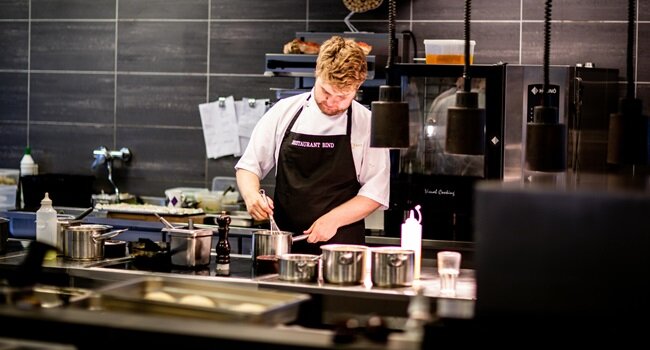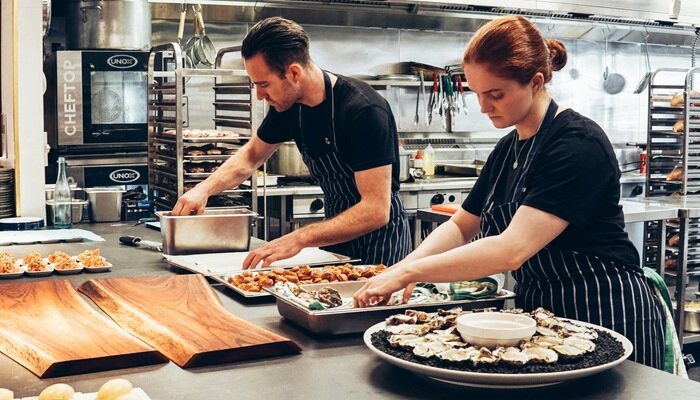In the food industry, cleanliness is more than just a regulation. It’s the backbone of your reputation. A spotless kitchen doesn’t just ensure compliance. It reassures customers that their health is in good hands. One slip in hygiene can lead to dangerous consequences, from costly foodborne outbreaks to losing trust with diners. Maintaining high standards of cleanliness is essential for the success and safety of your food business.
Prevents Foodborne Illness
A clean kitchen is the first line of defense against foodborne illnesses, which can occur when harmful bacteria, viruses, and pathogens contaminate food. For example, Salmonella, a common cause of food poisoning, thrives in unsanitary environments and can spread through contaminated food surfaces, utensils, or improperly handled raw ingredients.
By regularly cleaning and sanitizing workstations, utensils, and food storage areas, you eliminate the pathogens that can make customers sick. This reduces the risk of contamination and helps keep food safe to consume, protecting both customers and your business.
Strict hygiene practices also prevent cross-contamination, especially when dealing with raw meats and fresh produce. A lack of cleanliness can lead to the transfer of harmful microorganisms, causing serious outbreaks that harm health and damage your restaurant’s reputation.
To prevent foodborne illnesses and ensure a clean kitchen, staff training is essential. Servsafepracticetest.com is designed to help employees prepare and become certified, ensuring they know how to maintain a clean and safe kitchen environment.
Ensures Equipment Safety
Cleanliness plays a critical role in maintaining the safety and functionality of kitchen equipment. When grease, food particles, and bacteria accumulate on surfaces like grills, mixers, or slicers, they pose contamination risks and interfere with the proper functioning of the equipment. This buildup may cause overheating, clogging, or mechanical issues, leading to expensive repairs or replacements.
In addition to preventing breakdowns, clean equipment helps maintain the quality of the food being prepared. Unclean tools can affect the taste and safety of dishes, damaging your restaurant’s reputation. Keeping your equipment clean ensures it operates at peak efficiency, reduces health risks, and helps sustain food quality, ultimately benefiting both your kitchen’s performance and your customers’ trust.
Protects Food Quality
Cleanliness is directly linked to preserving the quality and taste of the food you serve. When kitchen surfaces, utensils, and equipment are not properly cleaned, they can harbor bacteria and old food residues that affect the flavor and safety of fresh ingredients. Even small traces of leftover food on cutting boards or utensils can transfer unwanted flavors or harmful bacteria to new dishes.
A clean environment ensures that each dish is prepared with fresh, uncontaminated ingredients. It also helps maintain the integrity of your recipes, as cross-contamination or food residue can compromise the intended flavor profiles. Cleanliness, therefore, plays a crucial role in delivering high-quality food consistently, enhancing customer satisfaction and protecting your business reputation.
Enhances Workplace Efficiency
A clean kitchen environment allows your staff to work more efficiently and effectively. Cluttered or unsanitary workspaces slow down food preparation, as staff need to clean or find tools before use. This leads to wasted time and decreased productivity during busy service periods.
Maintaining cleanliness ensures that equipment and surfaces are always ready for use, streamlining workflow and reducing unnecessary delays. A well-organized, clean kitchen fosters a more efficient work environment, allowing staff to focus on delivering high-quality food to customers promptly.
Builds Customer Trust
Maintaining a high level of cleanliness in your food business goes beyond food safety—it directly impacts customer trust. Diners expect their meals to be prepared in a clean, hygienic environment. Visible signs of cleanliness, such as spotless counters and well-maintained equipment, reassure customers that their health is a priority.
When customers trust that your establishment follows strict hygiene practices, they are more likely to return and recommend your business to others. Cleanliness becomes a reflection of your professionalism and dedication to serving high-quality, safe food, ultimately building long-term loyalty.
Prevents Legal Liabilities
Maintaining cleanliness in a restaurant or food business is critical to complying with health and safety regulations. These laws require strict hygiene practices to prevent contamination and ensure the safety of the food served. Failure to meet these standards can result in penalties, fines, or even the closure of your business.
Additionally, a lack of cleanliness increases the risk of foodborne illness outbreaks. Such incidents can harm customers and lead to costly lawsuits and reputational damage. Legal action resulting from unsafe food handling practices can severely impact your business.
By adhering to proper cleanliness protocols, food businesses can avoid legal liabilities and protect their reputation. Regular cleaning routines and proper hygiene practices ensure that your establishment meets regulatory requirements and safeguard both your customers and your business from legal risks.
Wrapping Up
Cleanliness is a powerful foundation for any food business. It safeguards the quality of your food, ensures equipment runs smoothly, and builds lasting trust with customers. Beyond hygiene, it also improves efficiency and minimizes waste, contributing to a more successful operation.

Ultimately, maintaining a spotless kitchen is not just about meeting standards. It’s about sustaining business operations and protecting the people you serve, ensuring they enjoy a safe and enjoyable dining experience every time.


















